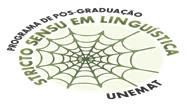Banca de DEFESA: ITAMAR JOSÉ BRESSAN
Uma banca de DEFESA de DOUTORADO foi cadastrada pelo programa.DISCENTE : ITAMAR JOSÉ BRESSAN
DATA : 03/07/2025
HORA: 08:00
LOCAL: Sala virtual
TÍTULO:
PORTUGUESE LANGUAGE TEACHING FOR IMMIGRANTS AT THE STATE EDUCATION NETWORK OF MATO GROSSO: A DOCUMENTARY RESEARCH FROM THE PERSPECTIVE OF LINGUISTIC JUSTICE
PALAVRAS-CHAVES:
Critical interculturality; Official documents; Welcoming language; Linguistic justice.
PÁGINAS: 203
GRANDE ÁREA: Lingüística, Letras e Artes
ÁREA: Lingüística
RESUMO:
This investigation, situated in the field of linguistic processes, aims to analyze official documents focused on the education of immigrants in the state of Mato Grosso, within the scope of the state public education system. The concept of Portuguese as a Welcoming Language (PLAc), significantly articulated with the concepts of critical interculturality, educational equity, and ethnic-racial relations, structures the concept of linguistic justice that forms the epistemological basis of this research. Events of various natures worldwide have led people to enter migratory processes, compelled to seek better opportunities and living conditions for themselves and their families in countries near or far from their homeland. In the state of Mato Grosso, due to the intense flow of immigrants from different parts of the world, the State Secretariat of Education of Mato Grosso (Seduc/MT) developed a policy to address the learning needs and development of knowledge of the Portuguese language for their insertion into the labor market as well as the Brazilian social context. Based on studies in Applied Linguistics (AL), this research intends to analyze how and whether the public educational policies produced in official documents—such as those from Seduc/MT—meet the premises of intercultural education and promote linguistic justice through guidelines for pedagogical work regarding the teaching of the Portuguese language, considering the culture of immigrants in contact with the culture of the host country. Thus, it seeks to interpret how these documents are conceived and, through reflection, analyze how they may contemplate the educational needs of immigrants, leading them to the critical development of linguistic and cultural competence. As theoretical contributions, the studies of Almeida Filho (1999, 2005, 2012); Bagno (1999); Barbosa (1986, 2019, 2020); Cunha and Handerson (2015); Santos (2002); Silva Neto (1986); Todorov (1999); among other authors who contributed with their definitions, characteristics, concepts, and procedures, are highlighted, aiming to provide an understanding of a work structured and developed based on bibliographic research and documents prepared for migratory education.
MEMBROS DA BANCA:
Presidente - 314.500.911-72 - LUCIA MARIA DE ASSUNÇÃO BARBOSA - UNEMAT
Interna - 132146001 - BARBARA CRISTINA GALLARDO
Externa ao Programa - 80792006 - CARMEM ZIRR ARTUZO
Externa à Instituição - DINAURA BATISTA DE PÁDUA - UFMT
Externa à Instituição - ROSELI PEIXOTO GRUBERT - UEMS
Externa à Instituição - VERA LÚCIA CONCEIÇÃO DA SILVA -



